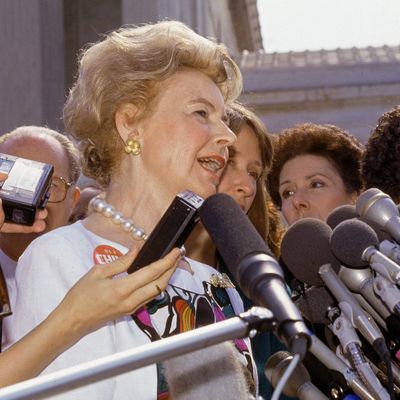
When news broke this week that conservative activist Phyllis Schlafly had died at 92, it was hard to find much sorrow in the occasion.
Schlafly was a vile hatemonger who spent her life organizing against people who were already struggling on America’s margins: LGBTQ people. Immigrants. Low-paid workers. And, most hypocritically, women who were open about their desire for autonomy and equality. Schlafly, a law-school graduate and full-time political operator, insisted to her dying day that her primary profession was as a housewife and mother of six. She’s best known, though, for leading the grassroots effort to kill the Equal Rights Amendment, beginning in 1973.
And so it’s tempting to say “good riddance,” post a GIF of the Wicked Witch’s feet curling away, and be done with the matter. But you can learn a lot from the successes of your enemies. And those of us who do care about autonomy and equality and progress should be grateful to the recently departed Mrs. Schlafly for imparting some important lessons.
Thanks, Phyllis, for telling the world that LGBTQ liberation is inextricable from women’s rights. A 1974 edition of her newsletter sneeringly connected the two causes under the banner of “the right to be different.” Which is really kind of poetic and beautiful. It can be hard to remember that our struggles are so deeply interconnected. Yet it was so easy for Schlafly to see the ways that various social-justice movements were in sync. She described pro-ERA marchers in Washington as “a combination of federal employees and radicals and lesbians.” Basically, a dream coalition — something to aspire to in all organizing efforts.
Thanks, Phyllis, for modeling the power of women’s involvement in politics. Sure, she did it in a hypocritical fashion — becoming a headline-making ideological leader while insisting that a woman’s place is in the home. Her actions spoke louder than her words, though. What if every woman who referred to herself as “just a wife and mother” were as politically active as Schlafly? I imagine the gender breakdown of state legislatures and Congress would look pretty different. She was living proof that movements — even movements for a so-called “return” to so-called “traditional values” — are stronger when women help to drive them.
Thanks, Phyllis, for the reminder that different women are always going to want different things. “Schlafly had discovered a genuine populist sentiment in a large female population that opposed the E.R.A., feminism and modern liberalism with the same intensity of emotion that feminists brought to their cause,” her biographer Donald T. Critchlow wrote. Indeed, there will probably always be some women, like Schlafly, who want to marry men and raise kids and identify first and foremost as wives and mothers. There will be other women who have no interest in men or marriage or children or homemaking — or only want some of those things. Schlafly reminds us that, even as we expand the range of options for women, there will always be some who desire nothing more than the status quo. We need to find ways to work with them when we can, and around them when we can’t.
Thanks, Phyllis, for reminding us of the power of grassroots activism. The pro-ERA momentum seemed unstoppable when she stood up and galvanized conservatives who, like her, believed that women’s liberation was a zero-sum game. If she could stem the tide of the ERA, then it’s certainly within our grasp to pass gun-control legislation, or federally subsidized child care, or paid family leave.
Thanks, Phyllis, for reminding us that there are cultural consequences when we claim our rights. Her involvement in the ERA vote shifted it from a relatively straightforward vote on Constitutional rights to a national debate about gender roles. I don’t think she was wrong to threaten that women’s equality would upend the structure of both the traditional family and the U.S. economy. I just disagree with her about whether that was a bad thing. Things are bound to change when whole classes of people are suddenly participating in our society more freely. That isn’t an excuse to curtail their rights, but it is a call to reshape our laws and policies accordingly. And, indeed, our institutions are still catching up to every major civil-rights victory that’s been won in the past century.
Thanks, Phyllis, for really owning it. Despite her claims about a woman’s rightful subservient place, she named her Schlafly Report newsletter after herself. She did not call it “The Anti-Equality Review” or something. Nope, Phyllis claimed it as her own. Which is one reason why she’s being eulogized as such an important figure today.
And finally, thanks, Phyllis, for reminding us to be constantly vigilant, even when we think our rights are safe. I don’t admire her hate-filled rhetoric or her retrograde beliefs. I do admire her persistence. As recently as a few months ago, she was creating a rift in her own organization over her desire to endorse a like-minded bigot, Donald Trump. Phyllis never quit. And neither can we.

